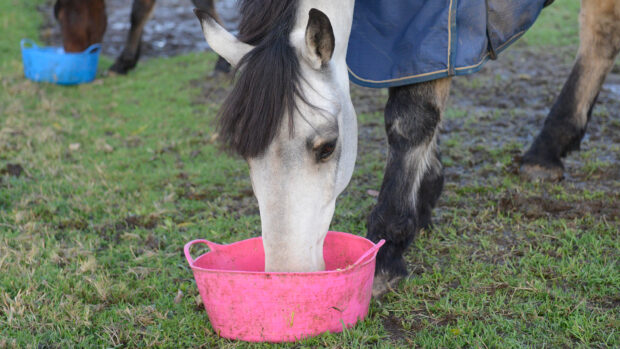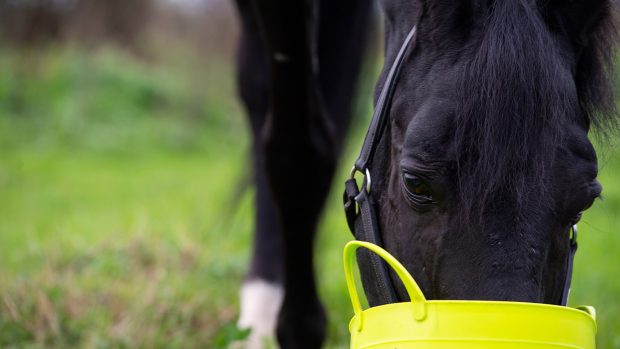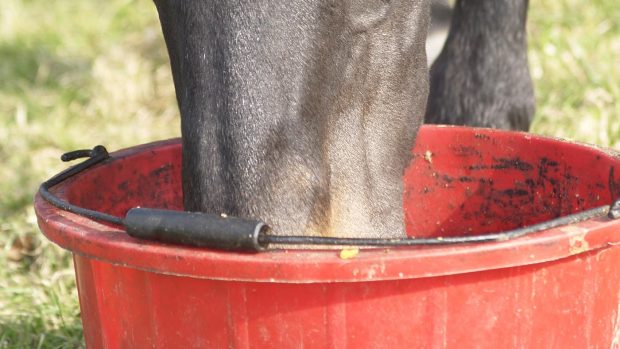While ideally all horses would sustain a healthy bodyweight year-round, this is often not the case, so we have asked the experts; how quickly will a horse gain weight if they are “poor doers”?
Poor doers will typically lose weight over winter as they struggle to maintain condition but a lean horse in February or March isn’t always a negative thing, particularly if it’s a native breed, who will quickly regain weight when the spring grass comes through.
“For those ‘good doers’, who are prone to gaining too much weight over the spring and summer months when the grass is plentiful, the winter is a great time to encourage weight loss. While you should feed sufficient supplementary forage, the poorer grass quality over the colder months helps to avoid them coming into the following spring already overweight,” says Katie Grimwood, equine nutritionist at Baileys Horse Feeds.
The rate at which a horse gains weight is hugely individual and will depend on how underweight he was and why. Weekly weight gain is very variable so in very underweight or emaciated horses it can take up to 3-10 months for them to return to their ideal weight.
“If a horse has been chronically starved you can’t just pile food into them to help them back to a healthy weight as you risk overwhelming their digestive and metabolic systems which can prove fatal,” explains Clare Barfoot, marketing and research and development director at Spillers.
Any dietary changes need to be made slowly and this includes re-introducing a severely malnourished horse to food. Once this has happened, a horse should have ad lib access to grass turnout wherever possible and/or good-quality forage and receive a balanced diet which is high in digestive fibre, oil and good quality protein with restricted starch. Pre and probiotics can also be a beneficial addition.
“Prebiotics encourage the proliferation of existing useful bacteria and can help support the microbial population during changes in feed and management,” says Lizzie Drury, senior nutritionist at Saracen Horse Feeds.
“While probiotics are generally suggested for shorter term use, prebiotics can be fed for longer periods of time and are commonly recommended during stressful events or periods that may impact the gut.”
If your horse is receiving a balanced diet with the appropriate amount of hard feed for their condition and workload and the recommended level of vitamins, minerals and quality protein but not maintaining weight, you need to look at their general health status. Find out whether they are suffering from any issues like gastric ulcers, kidney disease or absorption problems.
“It’s also important to ensure they are on a suitable worm control program and had their teeth checked. Are they appropriately rugged and warm enough? You want what you are feeding them to be going on as weight and not being used as an energy source to stay warm,” adds Clare.
Article continues below…
You might also be interested in:

Subscribe to Horse & Hound magazine today – and enjoy unlimited website access all year round
Do you know how much forage your horse is consuming? Even if you are feeding forage ad lib monitor their intake and check any hay or haylage that is being offered is actually being eaten and not just trodden into their bed. It is also worth checking your horse’s stress levels. Is he being bullied in the field by other horses and not eating enough hay or is he intimidated by his neighbour in the next-door stable and reluctant to eat?
“Look at the quality of the forage you are feeding and ideally choose a forage which has been cut early and is softer and leafier. Very coarse forages may provide fewer calories, meaning that more needs to be consumed, or be less palatable. A horse needs a minimum of 1.5% in dry matter of its bodyweight in forage per day, but this can be elevated up to 2.5% if weight gain is required,” says Katie.
Finally, don’t forget the old adage of feeding little and often. Offering frequent meals throughout the day is preferable to big feeds once or twice a day. The horse has a relatively small stomach and larger meals tend to be effectively pushed through the digestive system faster so may be less efficiently digested.
Horse & Hound magazine, out every Thursday, is packed with all the latest news and reports, as well as interviews, specials, nostalgia, vet and training advice. Find how you can enjoy the magazine delivered to your door every week, plus options to upgrade to access our H&H Plus online service which brings you breaking news as it happens as well as other benefits.




